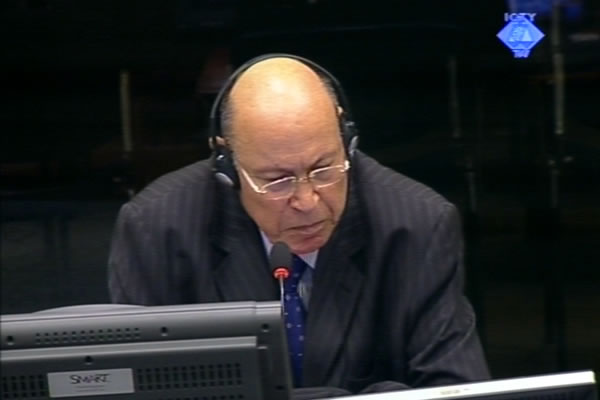Home
COMMANDER AND SUPREME COMMANDER
In a bid to shift at least a part of the blame for artillery and sniper terror campaign in Sarajevo from Ratko Mladic to Radovan Karadzic, the defense insisted that the RS president had been the supreme commander of the army. The witness agreed, but repeated that Mladic was the immediate superior officer of the corps that held the city under fire
 Hussein Ali Abdel-Razek, witness at the Ratko Mladic trial
Hussein Ali Abdel-Razek, witness at the Ratko Mladic trial In the cross-examination of Egyptian general Hussein Abdel-Razek, Ratko Mladic’s defense counsel tried to justify the shelling of Sarajevo, insisting there were legitimate military targets in the city. The defense counsel recalled the witness’s statement to the OTP investigators that the BH Army troops would attack Serb positions on the hills around the city from various locations in the city using mortars mounted on military vehicles.
General Abdel-Razek, who commanded the UNPROFOR Sarajevo Sector from August 1992 to February 1993, added that this vehicle would open fire from spots close to civilian facilities such as hospitals, the post office and even the UN mission headquarters. He and his colleagues went to Ejup Ganic to protest against this practice and make him put a stop to it. When he was asked if the Bosnian Serb army had the right to respond to provocations, the witness confirmed it, but insisted that the Bosnian Serb troops nevertheless had to bear in mind that there were numerous civilian buildings and UNPROFOR positions in the city.
Mladic’s defense counsel Petrusic insisted there was written evidence of Mladic’s efforts to stop the artillery and sniper attacks on the city. He showed the witness several documents in which Mladic ordered the Sarajevo-Romanija Corps command to stop targeting the city with artillery and snipers. The witness didn’t deny that such orders were issued, but said that in practice, there was little change. The ceasefires never lasted long, unlike the shelling and sniper attacks that ‘went on for long time’.
The defense counsel tried to disprove that the VRS Main Staff commander Ratko Mladic had sole responsibility for the war situation in Sarajevo. Petrusic told the witness that president Radovan Karadzic was in fact the supreme commander of the Bosnian Serb forces, reminding him that it was Karadzic who ‘rejected out of hand’ the conclusions of the London Conference at a meeting where Mladic was not present at all. The London Conference conclusions demanded that the heavy artillery around the city be placed under UNPROFOR supervision. The witness agreed with the claim, but stressed that the president had to make decisions ‘in cooperation with military advisors’. The witness was adamant that Ratko Mladic exercised control over the VRS and that he was the superior officer of the VRS Sarajevo-Romanija Corps commander Stanislav Galic, who was tried by the Tribunal and sentenced to life for crimes against the people of Sarajevo.
In the cross-examination, the defense counsel put it to the witness that the ethnic Serbs living in Sarajevo were in danger and wanted to leave the city. The witness responded that most of them in fact wanted the conflict to end as soon as possible and to ‘continue living together’.
After Abdel-Razek completed his evidence, the trial continued with the testimony of a protected witness who testified about the crimes in the Rogatica region.
Linked Reports
- Case : Mladic
- 2012-10-04 MLADIC’S RESPONSIBILITY FOR TERROR IN SARAJEVO
- 2012-10-03 MLADIC’S DEFENSE SAYS ARMY HAD NOTHING TO DO WITH CRIMES IN OMARSKA
- 2012-10-02 ETHNIC CLEANSING WAS BASED ON THE 'PROPERTY MAP' OF PRIJEDOR
- 2012-10-08 MLADIC THREATENS TO GO ON HUNGER STRIKE
- 2012-10-08 SARAJEVO WAS PUNISHED AND TERRORIZED
- 2012-10-09 SIMILARITIES AND DIFFERENCES BETWEEN US ARMY AND MLADIC’S ARMY
